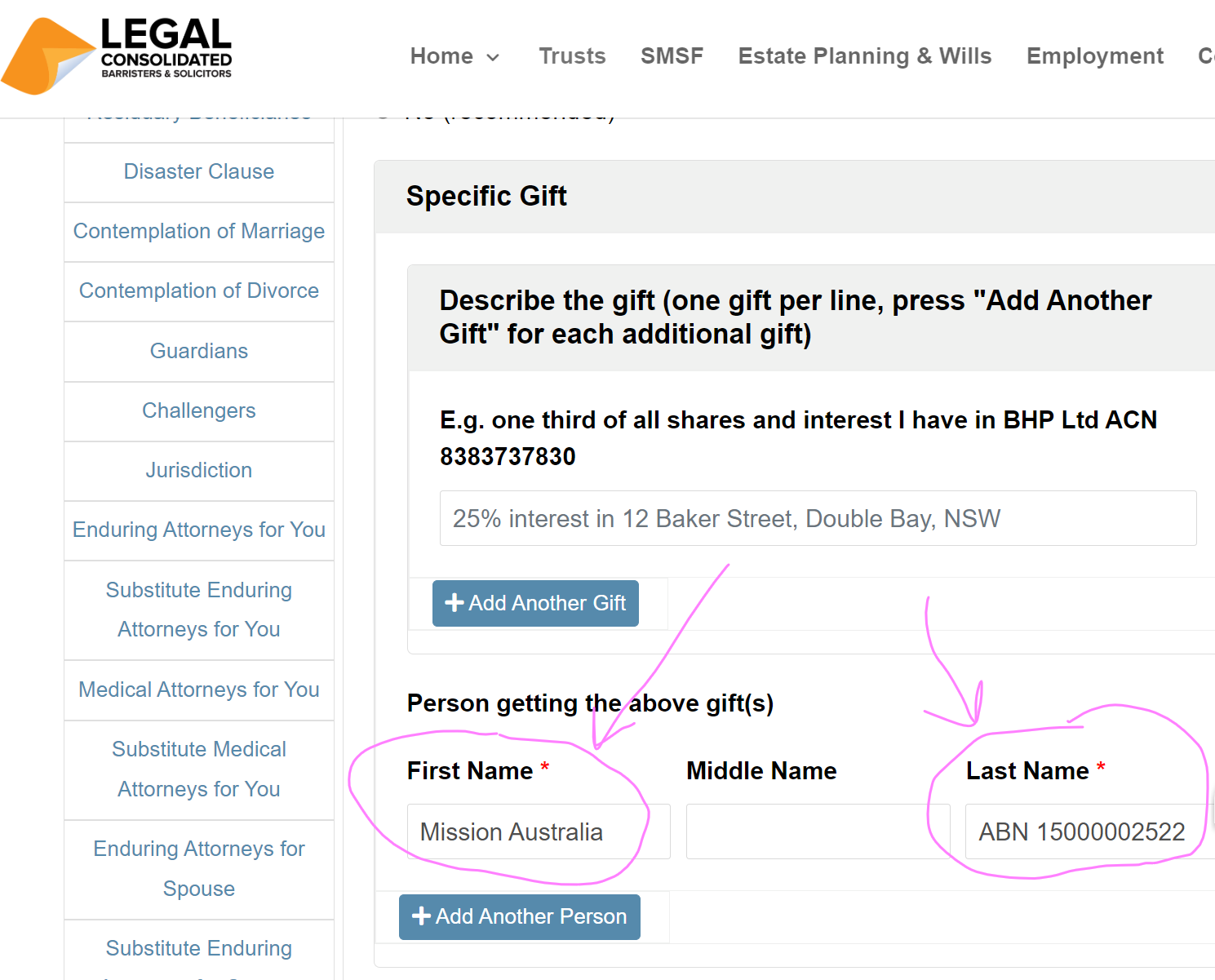Should I put Specific Gifts in my Will?
Your Will needs to be clear and legally enforceable. Specific gifts in a Will add complexity and tax issues.
What are Specific Gifts in Wills?
Specific Gifts are gifts of a particular item of property to a specific beneficiary. (The other type of gift are residual gifts. This is where what is left is paid as a percentage to the Residuary Beneficiaries.) Examples of Specific Gits include:
‘I gift all of my money in Bank Account number 2343-34 at Advance Bank, to my daughter, Samantha Muriel Davidson.‘
This bank no longer exists, does the gift fail?
‘I gift my Superannuation to my friend, Colin Wang (王).’
You have two superannuation accounts, which one goes to Colin, or is it both? Also, there is 32% tax on your superannuation. If you had left your Superannuation into your Will as part of the residuary estate then your executor could have reduced that superannuation death tax to zero. Hang on, your superannuation fund after you die is directing that the superannuation not even go into your Will (you forgot to do a Binding Nomination) it pays your superannuation directly to your ex-wife who you forgot to divorce. So, the gift of superannuation fails anyway.
“I gift my real estate located at 242 Grenville Street, Clarinda, Victoria, to my son, Jake Anderson Terriaca.“
However, this property was sold under your power of attorney to get you into a good nursing home after you lost mental capacity.
“I gift my 500 shares of Commonwealth Bank of Australia (ASX:CBA) to my nephew, Jordan James Cook.“
These shares are heavily pregnant with Capital Gains Tax. Who pays the CGT? Your estate or your nephew? As lawyers we are going to make a lot of money out of your Will, as we now need to go to court to find the answers to these questions.
‘I gift 2,500 shares in BHP to my daughter Joanne Dutton Cornwell.‘
BHP changed its name to BHP Billiton Limited in 2017. Does the gift fail? We will have to go to Court after you die to find out. Hopefully, the Will was home made so that lawyers make even more money from the court proceedings.
‘I gift $2m to my son Abraham Joshua Heschel.‘
This was all fine and dandy while you had $4m at the time you made your Will. This is 2m in cash and a $2m home. So half goes to Abraham and the other half goes to your daughter as the residuary beneficiary. E.g. 100% to your daughter. However, your family had to spend $2m to keep you going when you got Alzheimer’s disease. Therefore, you end up dying with only $2m. Since specific gifts are paid out first, Abraham gets all of your estate. Your daughter misses out. Now your son Abraham is a decent enough chap, but his wife is a horror and refuses to hand any money back to your daughter. Where did the estate find the $2m since there was no cash left? The estate sold the $2m home and gave the money to Abraham.
‘I gift all my personal belongings to my wife, Amalie Emmy Noether.‘
However, the expression ‘personal belongings’ has two different means. So off we go to court to work out what you meant? Is it just your clothes and tools in the shed? Does it include your $1m stamp collection?
‘Wedding ring to Mavis Johnson.‘
But now the wedding ring is subject to Capital Gains Tax.
The four risks when putting Specific Gifts in your Will
Here are four risks associated with including specific gifts in your Will:
- Ademption: This occurs when the asset in the Will no longer belongs to the Will maker at the time of their death, rendering the gift void. For example, if the Will maker sells the property at 128 Melbourne Road and buys another property, the original gift to Jake Smith is adeemed, meaning he receives nothing because the stated asset is no longer available.
- Confusion if a beneficiary of the specific gift dies before you: There is confusion if the beneficiary dies before the Will-maker. Laws differ in each Australian state and territory on whether the gift lapses or passes to the deceased beneficiary’s descendants. This leads to disputes and unintended consequences.
- Unequal Sharing of Taxes for a Specific Gift: Specific gifts result in an unequal sharing of death taxes among beneficiaries. This is particularly relevant to where one of the four death taxes applies. The specific gift does not set out as to who bears the tax burden. Is it the beneficiary of their own gift? Or are the death taxes split equally, or do the residuary beneficiaries pay them? It is usually the latter in Australia.
- Unequal Sharing of Expenses: Administering a Will’s specific gifts can be costly. However, the residuary beneficiaries pay 100% of those costs. This creates an imbalance in how the estate’s burdens are shared among beneficiaries.
Most words and expressions in Specific Gifts in Wills are ambiguous
Specific gifts create confusion and leave beneficiaries wondering how to proceed with estate administration. Ambiguity occurs when a word or phrase can be interpreted in different ways.
Ambiguous wording in specific gifts leads to disputes and complications in administering your estate. Australian courts have encountered numerous instances where terms or phrases in Wills have been deemed ambiguous in specific gifts. The beneficiaries have to go to court to work out what you meant. Here are some examples of words or phrases commonly found in Wills that Australian courts have considered ambiguous:
- “Wish” – this expression usually causes the gift to fail.
- “Children” – This term can cause ambiguity if it’s unclear whether it refers to biological children only, includes stepchildren, or children from multiple relationships. Courts often need to consider the Will maker’s family structure and any statements they made that might indicate their intentions.
- “Family” – Similar to “children,” the term “family” can be vague. It may refer to immediate family members only (such as a spouse and children) or could include extended family such as cousins, nieces, and nephews.
- “Household Goods” – This phrase can lead to disputes about what exactly qualifies as ‘household goods.’ Does it include all items within a home, such as appliances and furniture, or just personal belongings?
- “Personal Effects” – This term is problematic. Does it include only personal items such as clothing and jewellery? Or, does it extend to all personal possessions, including credit cards, cars and technology?
- “Reside” – When a Will stipulates that a beneficiary can “reside” in a property, does this mean they can live there rent-free? Are there any conditions regarding how long they can stay? This term can lead to different interpretations of the rights and obligations it confers. Is it a Life Estate or a Right to Reside?
- “Maintenance” – If a Will provides for the “maintenance” of a beneficiary, the extent and nature of this maintenance can be unclear. Does it cover basic needs, or does it extend to more comfortable provisions that include education, healthcare, and other expenses?
- “Issue” – This term is often used to refer to descendants, but its scope can be ambiguous, especially concerning whether it includes all descendants or only direct children.
- “Estate” – While it might seem straightforward, disputes can arise over whether “estate” refers to all assets owned by the deceased or only those assets not otherwise accounted for in specific bequests.
Each of these examples illustrates how specific gifts in Wills can be confusing. Specific gifts lead to court battles, where judges must interpret the Will’s terms in light of evidence about the Will maker’s intentions. This includes things you may have said when you were alive, the overall context of the Will, and your family circumstances. Specific gifts are a recipe for disaster.
How do Courts try to give meaning to specific gifts in Wills?
In cases of ambiguity in specific gifts, Australian courts must look beyond the wording of the gift. This is to try and unravel the dead person’s intentions. This involves considering:
- The Will Maker’s Intentions: What was the overall intention as expressed in the Will? Courts try to maintain fidelity and overall fairness to the Will maker’s overall wishes.
- Extrinsic Evidence: Evidence outside the Will, including statements made by the Will maker, documents, and the circumstances surrounding the drafting of the Will, are examined under the complicated laws of evidence in each state of Australia.
- Normal Usage and Definitions: How are terms generally understood in common parlance or by legal definition? Courts consider how broadly similar terms are typically treated. Does a migrant from Croatia treat the word differently to a third-generation cattle stud farmer in Rockhampton and Taroom?
- Precedents: Previous judicial decisions involving similar wording can guide the interpretation. Every state is different, and judicial decisions and views change over time.
What happens if the Specific Gift in my Will is gone before I die?
Q: When I die, the gift is gone:
- I gift my $2 million property to Abraham and
- The remainder of my estate, which is $2 million in cash, is gifted to my daughter, who is the sole residuary beneficiary.
However:
- Scenario one: what if the cash is spent on medical expenses, leaving only the property?
- Scenario one: what if the property is sold to pay for the medical expenses and the cash is left untouched, would Abraham end up with nothing since his specific gift was sold before my death? Would his sister then get all the remaining cash as the residual beneficiary unless there were any legal challenges?
A: Scenario One
I assume your estate is currently worth $4m. This is a $2m property and $2m in cash. Specific gifts are indeed paid out first. So, Abraham gets the $2m property. What remains goes to the residuary beneficiary. Since there is nothing left, your daughter, as the residuary beneficiary, gets nothing.
A: Scenario Two:
In your second example, the property is sold before you die. Therefore, the specific gift fails. Abraman gets nothing. Your daughter, as the residuary beneficiary, gets 100% of your residuary estate. This is $2m. Your daughter, therefore, gets $2m.
This is a common outcome. You get dementia, or you forget what you put in your Will 30 years ago. You or your children may sell your assets, especially real estate, because maintaining a property is time-consuming.
The Principle of Ademption in Australian Wills
The legal doctrine of ademption states that if a specific gift in your Will is no longer part of your estate at the time of your death, the gift fails, or ‘adeems’. This means the beneficiary of the gift is not entitled to any substitute or equivalent asset.
For instance, if you leave your beach house to your sister, but the house is compulsorily acquired by the government before you die, your sister does not automatically receive the compensation paid for the acquisition. This legal assumption is based on the idea that the Will maker would have made new arrangements or updated the Will if they intended for the beneficiary to receive something else.
Unintended Consequences and Potential Injustices of a gift in your Will that is sold before you die
This principle of ademption leads to significant unintended consequences and injustices. Often, Will makers forget to update their Wills following changes in their assets, or they lose mental capacity to do so due to illness or old age.
You can update Legal Consolidated Wills for free, but without the ability to change the Will, the intended beneficiaries are left without the gifts intended for them.
This is particularly sad when those specific assets are sold to cover expenses such as medical bills or nursing home fees, leaving the originally named beneficiaries without their expected inheritance.
Other silliness that comes from specific gifts in your Will:
- The $2m property is pregnant with $900k of capital gains tax. So your boy gets a net of $1.1m. The daughter gets a net of $2m. (There is no CGT on cash.)
- You are foolhardy to believe that you know the answer to these three great uncertainties:
- the assets you will own at the time of your death;
- the laws that will be in effect; or
- the hour of your death.
- You take out a $2m loan mortgaged against your property. When you die all your expenses are paid out first. So the $2m in cash goes to pay the bank. The unencumbered debt-free property goes to your son. Your daughter gets nothing.
Real-life examples of unfairness with Specific Gifts in Wills
- Uneven Asset Valuation: You leave your prized art collection, valued today at $500k, to your niece. At your death, the collection’s market value soars to $1.5m due to the artist’s rising popularity. Meanwhile, your nephew receives $500k in ASX shares, which have not gone up in value. This creates a significant disparity in the value of their inheritances due to fluctuating market conditions.
- Asset Depreciation: In your Will you gift a vintage car to your eldest child, valued at $100k. However, due to market changes or deterioration in condition, the vehicle is worth only $50k at your death. Simultaneously, the cash you leave to your second child maintains its value, leading to unequal distributions. Thirdly, the shares you gift to your third child skyrocketed in value.
- Regulatory Changes Impacting Value: You leave a commercial property to one child, free of mortgage, but new zoning laws devalue the property significantly. Another child receives a similar value in stocks, which appreciates, causing not only financial imbalance.
- Changes in Asset Ownership: You gift the shares in your family business to your oldest daughter. However, you later need to sell your shares for financial reasons. The specific gift fails, leaving that beneficiary with nothing unless you update your Will, which you can do for free with Legal Consolidated. However, sadly, you have a car accident and lose your mental capacity, so you can no longer update your Will.
- Insurance Policies and Liabilities: You make a specific gift of a life insurance policy to one child, and the policy lapses or its terms change unfavourably before your death, that child may receive far less than intended, while other children receive their full value.
- Unexpected Liabilities on Property: You leave a rental property to one child, thinking it’s a generous gift, but unknown back taxes or a lien that surfaces after your death. The cost of resolving these debts might significantly reduce or even nullify the intended benefit.
These examples highlight the unpredictability and potential unfairness of specific gifts in Wills.
Ambiguities of the term ‘Personal Belongings’ in a Will
Almost every word in a specific gift has more than one meaning. As an example, consider the expression ‘personal belongings’
-
Items included when you use the words ‘personal belongings’ in your Will:
- Narrow Interpretation of ‘personal belongings’: Perhaps the will-maker used ‘personal belongings’ for items of a personal nature used by the dead person daily, such as clothing, personal electronics, and personal care items.
- Broad Interpretation of ‘personal belongings: Other family members may argue the expression includes all personal assets, including collections (like stamps, art, or antiques), jewellery, and even vehicles or personal documents.
-
Do ‘personal belongings’ include high-value Items:
- The inclusion of high-value items, such as a $1 million stamp collection, could be contentious. Is such a collection considered a personal belonging, or due to its value, should it have been explicitly mentioned?
Ambiguity in the word ‘use’ when interpreting a Will

Even the single word “use” in a Will is ambiguous as it lacks a legal definition, encompassing a wide range of items such as clothing, jewellery, furniture, personal effects, or even sentimental objects.
This vagueness leads to differing interpretations among beneficiaries, causing disputes over what is included or excluded.
Even a single word such as the word ‘use’ is open to uncertainty.
The Supreme Court of Victoria, in Re Prior; Niran v Prior [2022] VSC 31, attempted to interpret the word ‘use’ in the dead person’s Will.
The dead person made a Will dated 9 April 2019. He died 6 weeks later. Clause 3(1)(b) of the Will contained a specific gift:
The land at 160-180 Tarrango Road, Yarra Junction, Victoria to Tahl [stepson].
But not the contents of three shipping containers located on the land.
This is on the condition that Tahl grants a licence for my Executors to use the property at 129 Waverley Road, Malvern East, Victoria rent free. This is for a period of two years from the date of my death with all rates, insurance premiums, maintenance costs and other outgoings paid from my Residuary Estate.
The stepson asked the Court for guidance on interpreting the Will. The executors, who were the deceased’s brothers, argued that the stepson did not meet the Will’s conditions since he lived on the property and thus lost his half-interest. They claimed the property was meant for their exclusive ‘use’.
The issues in Re Prior; Niran v Prior
The issue revolved around the interpretation of ‘use’ in the Will, with legal definitions including ‘the right to benefit from’ or ‘to employ or utilise’, specifically regarding land as ‘possession and use to derive income or other benefits’. However, the general meaning is broader.
The Court determined that the license granted in the Will was not exclusive, which meant the stepson could live at the property per the license without violating the conditions or losing his interest. The deceased, an artist, had many belongings and the executors needed two years to manage his estate properly — this included archiving, cataloguing, promoting, and selling his artwork. Also, at the time the Will was made, the stepson was residing on the property. These circumstances aligned with the intent that the license in the condition was meant for this purpose, and ‘use’ did not imply exclusive possession.
Legal Consolidated’s Free Lifetime Will Updates and Advice
At Legal Consolidated, we offer a unique benefit to those building their Wills, POAs and Medical POAs with us: the ability to update these documents for free for the rest of your life. This ensures your Will can be updated by you to reflect your current wishes without any additional cost.
Also, we provide free advice to both you and your executors, simplifying estate management and mitigating potential risks and confusion.
Start building your Will for free to learn about Specific Gifts
Our free online building process is not only educational but also answers questions about estate planning and specific gifts. We encourage starting this process as a first step, supplemented by personalised guidance through Chat and telephoning us to review your answers.
The building process sets out why you should not include specific gifts in your Will. But if you do, our online building process takes you through how to put specific gifts in your Will.
An alternative to a specific gift is to leave everything as residuary gifts
When building a Will, consider legal and financial factors to ensure your estate is managed exactly as you desire upon your death. Specific gifts in a Will introduce complexities, such as ademption and unequal tax burdens. An alternative approach is to distribute your estate as residuary gifts. For instance:
- Josip Broz Tito – 50%
- Mima Jaušovec – 50%
This method avoids the potential pitfalls of specific gifts by allowing beneficiaries to allocate assets flexibly. With 3-Generation Testamentary Trust Wills, beneficiaries can divide the estate effectively, perhaps assigning shares to one and cash to another according to their needs or preferences.
Every Will must have a Residuary Beneficiary clause. That is why it is a mandatory field when you build your Estate Planning bundle on our law firm’s website.
The Case for Residuary Gifts – and leaving out Specific Gifts
Residuary gifts offer several advantages over specific gifts:
- Fairness and Balance: They ensure a balanced distribution of the estate based on proportions set out by the Will maker, which can adapt to changes in the estate’s value or composition over time.
- Reducing Complexity: By not tying specific assets to specific beneficiaries, residuary gifts avoid the legal complexities of ademption and simplify the executor’s role in estate administration.
- Legal Enforceability: Unlike Wish Lists or stickers, residuary gifts are legally binding and ensure that the Will maker’s fundamental intentions are upheld.
Does a Wish List replace the need for specific gifts?
In estate planning, achieving clarity and ensuring intentions are legally enforceable is crucial. Specific gifts in Wills often lead to complexities such as ademption, unequal sharing of taxes, and confusion during estate administration. An alternative is to use a Wish List or stickers on items to convey the Will maker’s preferences for distributing personal items.
What is a Wish list – is it part of my Will?
A Wish List, often referred to as a letter of wishes, memorandum of wishes, or statement of wishes, is a document that accompanies a Will but does not legally form part of your Will
In contrast, a Will is a legally binding document that states how your estate is distributed upon your death. A Wish List serves as an informal guide to express the Will maker’s personal preferences and desires regarding the distribution of certain items or the management of the estate. E.g.
I have spoken to my next-door neighbours, Joan and Frank, and they are happy to take on the ownership of my dog Tonti.
Legal Status of Wish Lists and Stickers
A Wish List or the use of stickers in estate planning are informal methods used by a Will maker to express their preferences for who should receive personal belongings. These methods do not carry legal weight and are not enforceable in the same way that specific gifts in a Will are. While this might seem a limitation, it also reduces the legal complexities and risks associated with specific gifts.
Advantages of using Wish Lists and Stickers on furniture together with your Will
- Flexibility and Simplicity: Wish Lists and stickers allow for a more flexible and straightforward approach, especially suitable for items of sentimental value rather than significant monetary worth. They can be easily adjusted without the formalities and costs associated with altering a Will. (Legal Consolidated updates your Will for free – for life.)
- Reducing Legal Risks: By avoiding specific gifts, which can lead to ademption if the assets are no longer part of the estate at death, Wish Lists and stickers minimise potential legal disputes and complications.
- Complementing Residuary Gifts: These informal methods work well alongside residuary gifts, where the remainder of the estate is divided proportionally after debts, taxes, and expenses are paid. This approach ensures all beneficiaries receive a fair share of the estate, reducing the inequality and contention that specific gifts cause.
Limitations and Risks of Letters of Wishes and Stickers
- Non-binding Nature: The main risk is that these informal directives might be ignored by executors or beneficiaries, particularly in contentious family situations or if significant assets are involved.
- Potential for Misinterpretation: If not clearly communicated, Wish Lists and stickers could lead to misunderstandings and administrative headaches, particularly if the Will maker’s intentions are not detailed or explicit.
What can you put in a Wish List?
Creating a letter of wishes is a thoughtful way to supplement your Will, providing additional insights and guidance to your executors and trustees that are not legally binding but can help clarify your intentions. These are the items most commonly put in a Wish List:
1. Wishes as Funeral Arrangements and Requests
A Will should NOT contain funeral arrangements. A Wish List can suggest any particular wishes for your funeral service, such as location, type of ceremony, and music preferences. While these requests are not legally binding, they can offer comfort and direction to your family.
2. Burial or Cremation Preferences
Whether you want to be burnt or buried should not be included in your Will. Instead, you can state your preference for either burial or cremation and if applicable, where you might like your ashes to be scattered. This can also include any instructions or rituals you wish to be followed.
3. Wishes as to Organ Donation
This must not be put in the Will. Rather, if you wish to be an organ donor, clearly state this intention, including any specific conditions or limitations you want to impose. This helps ensure that your wishes are known and can be acted upon promptly. More importantly, make sure you have followed the forms from your state government.
4. Wishes as to Care and Guardianship of Children
Guardianship clauses SHOULD BE put in your Will – and Legal Consolidated’s online questions encourage you to do so. Further, outside of the Will, you can guide how you wish your children to be raised, touching on aspects such as their education, religion, cultural upbringing, holiday traditions, or sports involvement. We have found this to be valuable for the guardians that you nominated in your Will in maintaining the lifestyle and values you desire for your children.
5. Wishes for Non-Estate Assets
Outline your wishes for assets that your Will, such as self-managed superannuation funds or joint tenancy assets do not control. This helps prevent confusion and ensure that all aspects of your financial life are considered. But with a 3-Generation Testamentary Trust Will, your superannuation should go into your Will to get rid of the 32% death tax on superannuation.
6. Advice on how to use the inheritance in the Will
Although you cannot enforce how beneficiaries use their inheritance, you can suggest how you would like them to use it—such as for paying off debts or purchasing a home. This can be particularly helpful for younger beneficiaries or those not accustomed to managing large sums of money. However, the better course of action is to educate your children on such issues throughout their lifetime. A few words in a Wish List on the matter are of little help, in our experience.
7. Contact Details for Trusted Advisers
Include the contact information of key advisers such as your lawyer, financial adviser, or accountant. These professionals can provide invaluable assistance to your executors or trustees in managing your estate effectively. For example, Legal Consolidated Wills and POAs come with free advice to your executors, beneficiaries and people you appoint in your POAs.
By including these elements, your letter of wishes can serve as a guide that supports and enhances the directives laid out in your Will, ensuring your personal values and preferences are honoured, even if they are not legally enforceable. This document can impact how your estate is handled and provide reassurance and clarity to those managing and benefiting from your Will.
Free sample of a Wish List
Below is a sample of what a Wish List, or letter of wishes, might look like. This example is meant to provide a template that can be adjusted according to individual preferences and circumstances:
[Will makers Full Name]
[Your Address]
[City, State, Postal Code]
Australia
[Date]
To My Executors and Trustees:
This letter of wishes is intended to complement my last Will and testament. It expresses my personal wishes and provides guidance regarding my intentions for the distribution and management of my estate and other personal matters upon my death. Please note that this document is not legally binding – it has absolutely no force of law – but is provided to help you understand my preferences and values.
Funeral Arrangements
I would like a simple funeral service held at [Name of Funeral Home or Location], and I wish for the song “Run to Paradise” by the Choirboys to be played during the ceremony. I prefer not to have a large or lavish funeral but rather a modest gathering of close family and friends.
Cremated
While I am Roman Catholic I still wish to be cremated. I would like my ashes to be scattered in the Blue Mountains National Park. Please ensure all legal requirements are adhered to when arranging for the scattering of my ashes.
Organ Donation
I am a registered organ donor with the Australian Organ Donor Register. My wish is for any organs that are suitable to be donated to those in need. Please consult with the hospital or organ donation agency promptly to facilitate this process.
Care and Guardianship of Children
For the upbringing of my children, I wish for them to continue their education at their current schools if possible. I hope they will be encouraged to participate in holiday traditions we have established, such as our annual family vacation to Darwin during the winter months. It is my wish that they also remain active in sports, specifically cricket. I am Roman Catholic but I say no more.
Non-Estate Assets
There is potentially a 32% tax on my superannuation. I have prepared a 3-Generation Testamentary Trust Wills with the law firm Legal Consolidated Barristers & Solicitors. The Will contains a Superannuation Testamentary trust which seeks to reduce this death death tax to zero. But that can only happen if the superannuation goes into my Will. I have done binding nominations forcing the superannuation fund to payout to my estate.
Use of Inheritance
I suggest that my beneficiaries use their inheritance primarily for educational purposes and to assist in purchasing their first homes. I hope this will provide a solid foundation for their future financial security.
Fluffy the dog
I have spoken to my neighbours, Bev and Kevin, they are happy to look after Fluffy. I have also befriended a magpie that had his wing broken. He is unable to look after himself and hops around the backyard. I feed him each day raw meat. Please let Bev and Kevin know, in case they want to look after him, as well.
Trusted Advisers
For taxation, superannuation and financial advice, please contact my financial adviser, [Adviser’s Name], at [Adviser’s Contact Information], and my accountant, [Accountant Name], at [Accountant’s contact details]. Included in the cost of the Will is free legal advice to my executors from the law firm that prepared my Will being Legal Consolidated Barristers & Solicitors..
Thank you for attending to these matters with care and respect for my wishes.
Sincerely,
Print Name only – do not sign. Just print your name.
This template serves as a starting point to document your personal wishes in a way that communicates your intentions to your executors and trustees while recognising that the letter itself does not carry legal weight.
Which is better Specific Gift clauses in my Will or Letter of Wishes?
While Wish Lists and stickers do not have the legal enforceability of specific gifts, they can be a valuable tool in estate planning instead of the dangerous residuary gift clauses in Wills. These informal methods can effectively convey the Will maker’s preferences for distributing personal items without the legal risks and complexity of specific gifts.
For those seeking to minimise potential disputes and ensure a fair and balanced distribution of their estate, focusing on residuary gifts augmented by Wish Lists or stickers for personal belongings may help. It may also help facilitate smoother estate administration and better align with the evolving dynamics of modern families and asset management.
Protects from death duties, divorcing and bankrupt children and a 32% tax on super.
Build online with free lifetime updates:
Couples Bundle
includes 3-Generation Testamentary Trust Wills and 4 POAs
Singles Bundle
includes 3-Generation Testamentary Trust Will and 2 POAs
Death Taxes
- Australia’s four death duties
- 32% tax on superannuation to children
- Selling a dead person’s home tax-free
- HECs debt at death
- CGT on dead wife’s wedding ring
- Extra tax on Charities
Vulnerable children and spend-thrifts
- Your Will includes:
- Divorce Protection Trust if children divorce
- Bankruptcy Trusts
- Special Disability Trust (free vulnerable children in Wills Training Video)

- Guardians for under 18-year-old children
- Considered person clause to stop Will challenges
Second Marriages & Challenging Will
- Contractual Will Agreement for second marriages
- Wills for blended families
- Do Marriages and Divorce revoke my Will?
- Can my lover challenge my Will?
- Make my Will fair: hotchpot clauses v Equalisation?
What if I:
- have assets or beneficiaries overseas?

- lack mental capacity to sign my Will?
- sign my Will in hospital or isolating?
- lose my Will or my home burns down?
- have addresses changed in my Will?
- have nicknames and alias names?
- want free storage of my Wills and POAs?
- put Specific Gifts in Wills
- build my parent’s Wills?
- leave money to my pets?
- want my adviser or accountant to build the Will for me?
Assets not in your Will
- Joint tenancy assets and the family home
- Loans to children, parents or company
- Gifts and forgiving a debt before you die
- Who controls my Company at death?
- Family Trusts:
- Changing control with Backup Appointors
- losing Centrelink and winding up Family Trust
- Does my Family Trust go in my Will?
Power of Attorney
 Money POAs: NSW, VIC, QLD, WA, SA, TAS, ACT & NT
Money POAs: NSW, VIC, QLD, WA, SA, TAS, ACT & NT
- be used to steal my money?
- act as trustee of my trust?
- change my Superannuation binding nomination?
- be witnessed by my financial planner witness?
- be signed if I lack mental capacity?
- danger of adding clauses
- Medical, Lifestyle, Guardianships, and Care Directives:
- Company POA when directors go missing, insane or die
After death
- Free Wish List to be kept with your Will
- Burial arrangements
- How to amend a Testamentary Trust after you die
- What happens to mortgages when I die?
- Family Court looks at dead Dad’s Will





